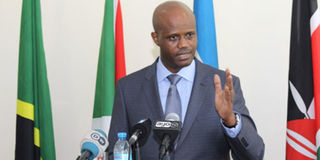Kenya polls: EAC pleads against repeat of violence

EAC secretary general Liberat Mfumukeko.
What you need to know:
- "We hope the elections will be peaceful. Kenyans should not destroy their country because of the political power", said the EAC secretary general Liberat Mfumukeko.
Arusha. With Kenyans bracing for repeat presidential elections on Thursday, the East African Community (EAC) has pleaded to Kenyans to avoid any poll related violence.
"We hope the elections will be peaceful. Kenyans should not destroy their country because of the political power", said the EAC secretary general Liberat Mfumukeko.
He said the regional organization has already deployed an observer mission to Nairobi to monitor the repeat presidential polls, hoping the exercise would be peaceful, fair and free.
"Let us pray the exercise will be carried smoothly so that the country can return back to normalcy after hectic campaigns witnessed in the last many days", he said on Monday October 24.
Mr Mfumukeko said was a key partner in the bloc and that EAC was not ready to see a repeat or likelihood of violence during or after the Thursday poll.
Elections in Kenya has been marred by violence, mainly along the ethnic lines, since the re-introduction of the multi-party system in the 1990s.
Ethnic killings preceded the polls in 1992 and 1997 when the then ruling Kanu fought its way into power against the revived opposition.
No serious violence were reported during the 2002 polls when independence era party was swept out of power. This also coincided with former President Daniel arap Moi stepping down.
The worst pre and post-election violence was seen during 2007/2008 during which over 1,300 were hacked to death and about 500,000 internally displaced.
During the recent polls, whose presidential results were annulled by the Court, about 50 people reportedly lost their lives in election-relation violence, according to human rights activists.
The election observer mission to Nairobi is headed by the EAC deputy secretary general (Political Federation) Charles Njoroge and comprises officials from the other partner states.
Its deployment is in line with the democratic principles and vlues espoused in the Treaty for the Establishment of the EAC, a regional bloc of six member countries.
In its preliminary report on the August 8th election, EAC called on the poll agency (Independent Election and Boundaries Commission - IEBC) to devise best ways to ensure the election process was better managed.
These include delivery of election materials to the polling centres in time, display of registers of voters for easy identification, among others.
Until yesterday, EAC observer mission was yet to issue and make public its comprehensive final report which was to provide an in-depth analysis, findings and recommendations.
The repeat presidential elections will be held after the Supreme Court of Kenya annulled the re-election of President Kenyatta during the August 8th polls on grounds the exercise was marred by many 'irregularities and illegalities'.
This time around incumbent Kenyatta will raise the Jubilee flag without is arch rival and main challenger during the last poll Raila Odinga of the opposition National Super Alliance (Nasa) who has dropped out of the race.
While the incumbent will seek re-election despite anger on the Court's decision,Nasa and its supporters continue to be critical of IEBC, saying it cannot hold a credible polls until it is reconstituted.
The Kenyan elections is reported to have impacted on the activities of the EAC, including the inauguration of the East African Legislative Assembly (Eala) which has been repeatedly postponed.
Speaking here recently, the Tanzania deputy minister for Foreign Affairs and EA Cooperation Suzan Kolimba admitted that the political tidings in the neighbouring country have stalled the law making process in the Community.
This is due to the fact that Kenya was yet to elect its nominees for Eala despite its Parliament and Senate was already back to business after the August 8th General Election.



